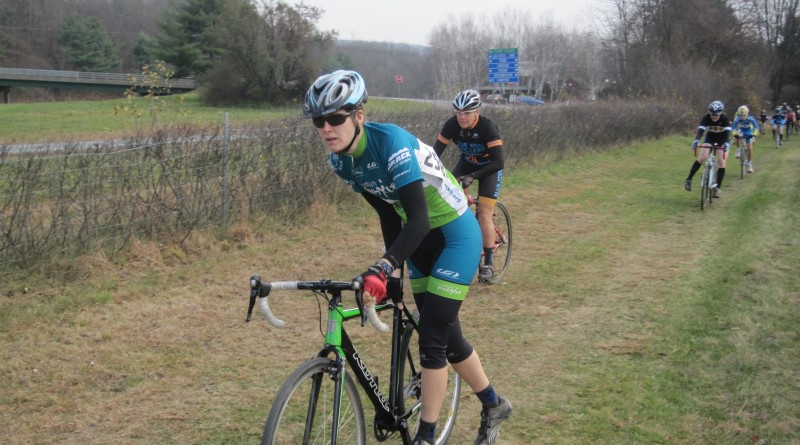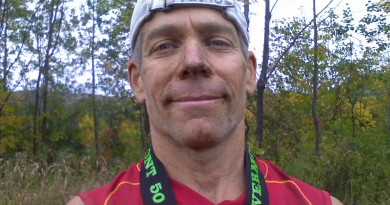Julia Sperry – Reader Athlete
Age: 42
Residence: South Burlington
Family: Husband, Jim
Occupation: Retirement plan analyst
Primary sport: Cyclocross
Julia Sperry discovered cyclocross in 2010 and has been racing ever since. The Category 3 rider spends most of her fall weekends on the road, traveling around New England, but the high she gets from racing makes it all worthwhile.
VS: What do you like about cyclocross? I have to admit, I’ve never understood the appeal of carrying a bicycle.
JS: I actually like getting off and on the bike. I’m the worst mountain biker on the face of the planet, but in cyclocross you have to learn skills like dismounting and remounting and suitcasing your bike over barriers. I practice that over and over again. Also, it’s a very short season from September to November, so you can concentrate your efforts. I get stronger as the season progresses, sometimes doing double races weekend after weekend. I get a little burned out traveling three to four hours for the races, but I like doing the race, getting my elbows sharpened, and all that argy-bargy. When you’re done it’s just a ridiculous high.
VS: How long have you been riding?
JS: I raced mountain bikes in high school when Catamount Family Center started their Wednesday-night series. We’d show up in t-shirts and shorts and hack around. I also did one year of road racing, but I only started cyclocross in 2010.
VS: How often do you race?
JS: I’ve done as many as 20 races a year, but this year, I’ll probably only do 15. You need to find places to stay and people to carpool with. I enjoy all that, but after the 15th weekend, I’m pooped.
VS: You recently competed in the Providence CX. How was that?
JS: It was a huge event with 135 women in the Cat 3/4 field. The race is the third one in the Verge series. The first one is at Catamount, and not that many people from southern New England come up for that, so I got some Verge points there, which put me in the second row for starting in Providence. That made a huge difference since I was ahead of 100 women. [Shawn, you can cut this question if we need room]
VS: Would you like to move up a category?
JS: I’ve already moved up from Cat 4 to 3, but don’t think I can make the leap to Cat 2 because of time constraints. Age isn’t on my side either. I have friends who catted up, but it’s hard at that next category. The field is smaller, but there’s a huge difference between the women in the front and the back, so it can be lonely in the back. Cyclocross for women has grown, but they haven’t added enough fields. In addition, women have to race with the juniors, and one year in Providence, it seemed like at every corner I came across a poor 10- or 12-year-old, and I didn’t have the heart to barrel around them or scream at them so I waited. It’s not the greatest strategy, but I’m not losing a podium shot over it.
VS: Tell us about your best race.
JS: I won a race at Paradise Cross in Windsor. That was very cool. It was the end of the season, so I felt very strong. The next day I raced in Putney and that was probably my best race even though I didn’t win. A woman who was faster than me dropped a chain so I passed her. I’ve never raced that hard in my life, and I came through at 4 or 5 laps and heard the official say I was done. Then the other woman came through, and they told her she had one lap to go, so I got back on the bike, but I was completely spent and couldn’t catch her. I’d never raced that fast and been that motivated before. I truly used everything I had. One of the things I love about cyclocross is that it puts me out of my comfort zone. I’m a slow twitch person so the speed and strength of the sport is not natural to me. I don’t really care how I finish, but I like that feeling that I can be fast and not entirely a turtle. I’m tall and skinny. You wouldn’t look at me and see a sprinter.
VS: How hard is it to keep yourself and your bike clean?
JS: I definitely clean my cross bike more than my road bike. There’s one race in Maine where you literally ride through cow manure. There’s mud that dries quickly and then there’s stuff that just cakes to your shoes and can break your derailleurs. At the race in Maine, they tell you to keep your mouth shut and make sure to wash afterwards. There’s one section where you come down a hill and the grass ends and you hit pavement right in front of the barn. One year I lost control and went through the course tape and the photos show this man watching the race and looking at me with his mouth dropping open and then running out of the way. My mouth is glued shut because of the manure. One year, the course actually went through the barn with the cows on either side. That was cool, but afterwards, we all lined up for the hoses and cleaned our bikes, our clothes, our shoes, and ourselves. I can get kind of girly at the first mud puddle, but when it’s splattered all over you, you start to feel gritty and badass. This year there haven’t been too many mudders.
VS: Is it true that cyclocross is mostly about competition, not recreation?
JS: That is true. The fall is the one time of year when I go cross crazy. I like riding recreationally with my husband and friends, but I really love racing and the competition. It’s an intense two months and then I get it out of my system. I guess it is an odd sport. We all stand around before the race talking about tire pressure. A friend calls it dressage for bikes. I like to keep it low-key because it’s too easy to go completely over the top with equipment, but I just love the whole package of going to races, seeing the same people, and challenging myself. It’s painful. It’s 45 minutes of being uncomfortable. You put up with the travel, the nerves, and the stinking porta-potties. Once you get through the start—which is where the accidents happen—I have a lot of fun. It’s like a high. I get more from that 45-minute burst than from a four-hour ride.


